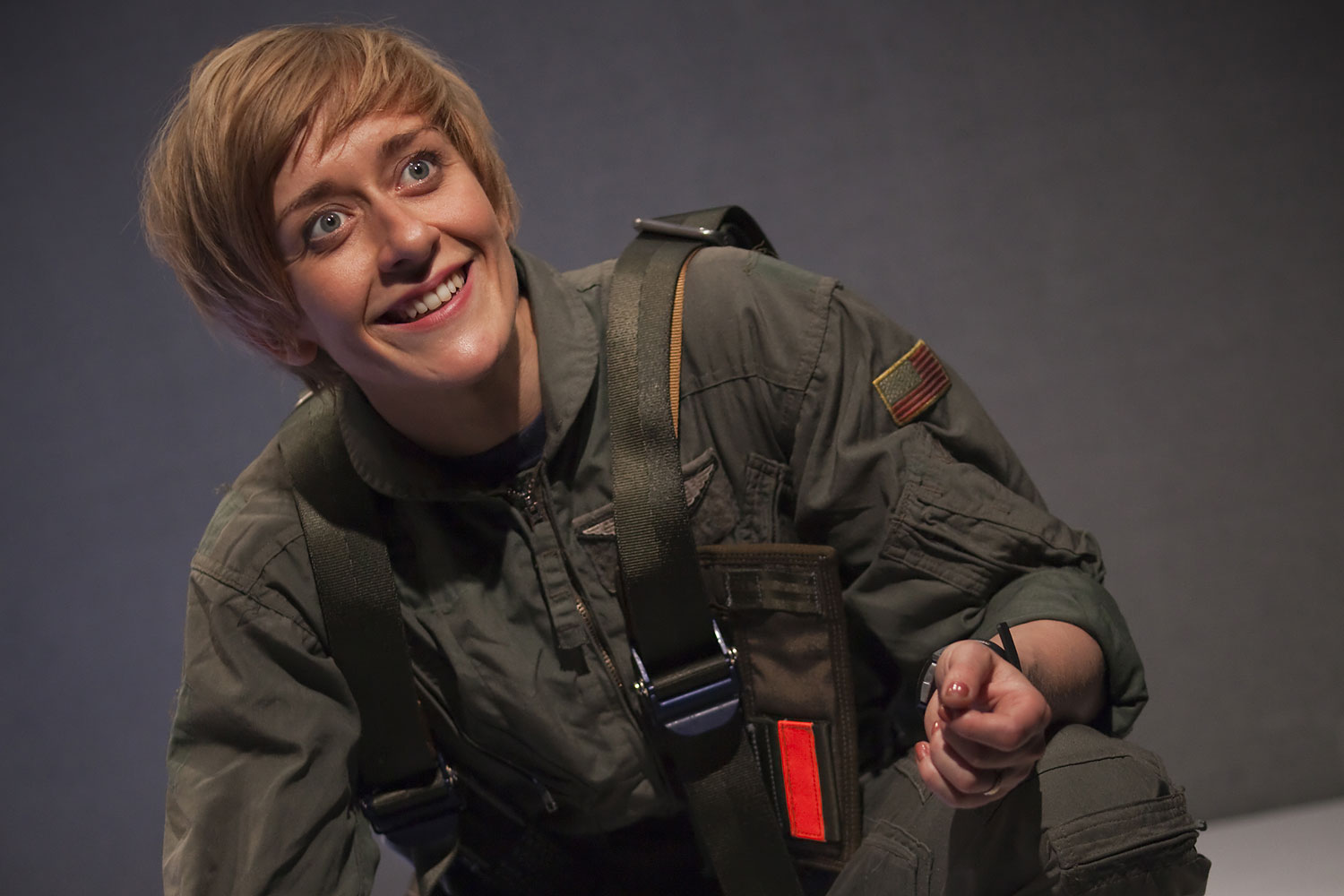Grounded, Gate Theatre
reviewed for Conservative Home, 26 September 2013

Lucy Ellinson in George Brant’s Grounded
I’m not the type of woman who ever dreamed of being a fighter pilot. But Lucy Ellinson, the dynamic sole-performer of the Gate Theatre’s Grounded, could have convinced me otherwise. For Ellinson’s pilot, it’s all about the free open sky – ‘my blue’. It’s about holding her own in the bar with the boys, it’s about bragging rights, but most of all ‘it’s the G-Force pressing you back as you tear the sky… you are alone in the vastness and you are the blue’.
But when she comes back after a three year hiatus (marriage and maternity – like all great plays about war, Trojan Women onwards, this is also a play about family) she’s told that the air isn’t where the US needs its air force. That although they’ve spent a million dollars training each pilot, the military isn’t even ordering F-16s any more. That the greatest statement of confidence her commander can place in her is to resettle her in Nevada. There she’ll live a double life, kissing her daughter goodnight each evening in suburbia but spending twelve hours a day back in the heart of a war zone – or rather, absorbed by the sight of a screen, stalking her prey through a desert, at the controls of an ‘unmanned’ drone.
And it’s neither gender, political qualms nor squeamishness that wears down Ellinson’s nameless heroine. She’s hardly wimpy about foreign policy – ‘it’s a new desert now Iraq is done stick a fork in it’, she deadpans. For the past decade, she’s been the best. Because she’s been immersed in a warzone for nine months of the year, surrounded by her buddies, not civilians. But switching from civilian to warrior every twelve hours is a challenge for any soldier. Rates of PTSD are as high for drone pilots as they are for fighter pilots after experiencing direct physical danger. Which is why ConHome readers, and anyone who cares about the West’s military capabilities, should respond to Grounded’s rallying call. The care of our soldiers is too big an issue to be left to lefties.
Full disclosure: the Gate Theatre has consistently impressed me, which is why I support it financially. But when I first heard that director Chris Haydon was bringing ‘an American play about drones’ to London, I inwardly groaned. Would this be a pacifist polemic telling us that evil Americans enjoy killing Pakistani children? A denunciation in the familiar pattern of liberal self-disgust? Unlike the majority of artsy types, I’ve never had misgivings about doing whatever it takes to kill those who desire to kill us first. It is horrific when US or UK weapons kill children or civilians by mistake. But on 9/11, 3000 civilians, eight of them children, were murdered not by mistake but by design – and since then, I’ve known that when it comes to the hardcore of Islamist militarism, we’re up against people who have far fewer qualms about killing our children than we have about theirs.
There are nuanced, more important arguments about the battle for hearts and minds amongst the great majority of people, who don’t fit into such easy categories – no one should group every soul in the Middle East into monoliths of identity labeled ‘enemy or friend’. (And as Tories, who believe that individuals chose their own path, why would we want to?) But if Grounded had been simply a ‘drones kill children’ play, I’d be the last person to recommend it.
Instead, this is a brilliant, dazzling play about how we treat our soldiers in a time of changing technology. Drone pilots receive no specialist counseling to help them transition from the battlefield to domesticity each night – ‘driving to war like its shift work’. And shift work it is – the drone never sleeps, hence its ability to track a suspect for miles, but pilots must– so they share missions, swapping shifts at the controls. As Grounded demonstrates, a trained fighter pilot can feel a personal pride in an individual strike – but handing over the controls without seeing the end of particular mission plays havoc with the natural peaks and troughs of adrenalin.
And their experience of the battlefield is far more intimate via zoom-in from Nevada than at high-altitude in the cockpit. The heroine of Grounded stalks her prey for days before a decision is made to strike –she can identify the branding of on a soda bottle discarded from her target’s car, discuss his clothing, detect his limp. And because a drone pilot doesn’t have to rush away afterwards, he or she can look their target in the eyes as he bleeds to death. All courtesy of a lens mounted 25,00 feet high.
In the end, it’s watching other people that drives the heroine of Grounded mad. A drone isn’t just a machine for killing: it’s the business end of surveillance culture gone global. As I’ve written before for ConHome, the greatest danger of state surveillance is not what our government does with its information – it’s the insecurity and paranoia that a culture of surveillance breeds in both the watched and the watchers alike. Whenever the NSA is mentioned, old wags like to nod and mumble a variant of Juvenals’ Quis custodiet ipsos custodes – but who watches the watchers? What Grounded forces us to ask is not just ‘who watches the watchers’, but ‘who’s doing their therapy?’




